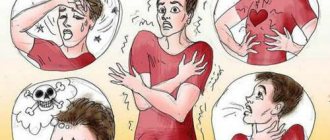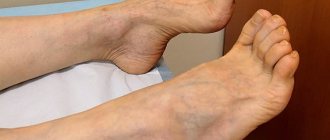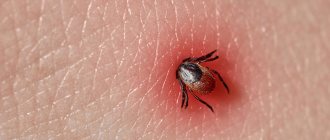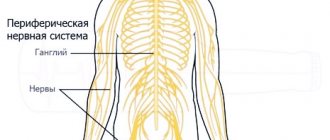It is very difficult for people living in the 21st century to have a healthy nervous system. Busy work, constant bustle, traffic jams, uncertainty about the future, financial and family problems - all this negatively affects a person’s psycho-emotional state. As a result, young people aged 25 to 45 years suffer from depression, irritability, insomnia, frequent mood swings and other problems of the nervous system.
You can fight nervous tension with synthetic pills, which litter the shelves of pharmacy chains. But natural remedies will bring more benefits. Soothing herbal tea is a good substitute for pills.
Soothing mint tea
To obtain a positive effect in restoring the nervous system, you need to know which herbs have a calming effect, how to brew and use them correctly.
What herbs are used to make tea that calms the nervous system?
Traditional healers and modern pharmaceutical and herbal companies offer a large number of natural ingredients from which you can prepare herbal teas for the nervous system. Let's consider which popular herbs are suitable for making soothing tea.
Chamomile
This flower is familiar to everyone. Its healing power has been known for a long time. The chemical composition of chamomile includes apiin, chamazulene, and matrice. These substances have a calming effect on the nervous system.
Chamomile officinalis
Tea from this plant has a weak sedative effect. Therefore, it will not be able to help with severe psycho-emotional disorders. But it is great to cope with minor nervousness, mild sleep disturbances and short-term depression. Chamomile can be used to make tea, decoction, infusion, or as an ingredient in aromatherapy. The delicate delicate aroma of the flower soothes and helps you fall asleep quickly.
Linden
During flowering, in June-July, linden produces a sweet, distinct and very pleasant smell. Its aroma evokes positive emotions, which is extremely beneficial for the nervous system. But this plant is not the only thing that benefits humans.
Linden is rich in beneficial substances. It contains flavonoids, tannins, essential oils, antioxidants, phytohormones, amino acids, carotene, minerals, vitamin C, and protein. All this makes linden a healing plant. Linden tea helps fight many diseases, including nervous system disorders. The drink has proven itself in the treatment of insomnia, neuralgia, nervousness, hypertension, and excess weight.
Linden flowers can be used as an independent component or as part of soothing herbal mixtures for preparing teas, decoctions, and infusions.
Linden blossom
Valerian
The plant resembles a tall fern. A strong sedative is prepared from its root. It is popularly called “valerian”. Clinical studies have proven that valerian has a positive effect on sleep, improves its quality, and helps you fall asleep faster. Valerian also relieves anxiety, reduces the negative effects of stress, and has a general relaxing effect.
Valerian is a natural, potent sedative. Its excessive consumption can cause headaches, stomach upset, nausea, and dizziness.
The natural soothing ingredient can be purchased in the form of tablets, tinctures, or as dry raw materials for making tea, infusion, or decoction yourself. It is the dried herb that is distinguished by its maximum benefits. Especially if the plant was collected and prepared with your own hands.
Melissa
This herbaceous plant is a relative of mint. Habitat: Crimea and the North Caucasus. Popular in Russia and Ukraine. Many people grow lemon balm directly in their garden.
The leaves of the herb contain a large amount of organic acids and essential oils. In addition, the chemical composition of the plant includes the following substances: flavonoids, stearins, saponins, tannins, calcium, potassium, magnesium, iron, copper, zinc, selenium, chromium, manganese, vitamins B1, B2, C.
Natural soothing remedy - lemon balm tea
Tea and decoction with the addition of lemon balm have a beneficial effect on humans. It is used for diseases such as:
- hypertension;
- disruption of the digestive system;
- anemia;
- problems with the cardiovascular system;
- elevated blood sugar levels;
- overvoltage.
In addition, healing remedies with lemon balm are excellent sedatives. Melissa tea is recommended for use for insomnia and nervous disorders. Doctors advise giving lemon balm decoction to children with increased hyperactivity.
Motherwort
Motherwort is another plant that is used as a sedative for nervous system disorders. Tea with motherwort is used for sleep disorders, anxiety, nervousness, mental and nervous tension, as well as arrhythmia, tachycardia, and hypertension.
Motherwort tea is an effective sedative. An important point is that you should not exceed the recommended dosage. Excessive consumption may cause allergies, stomach upset, drowsiness, dizziness and weakness.
Mint
The perennial herb has a calming effect. It is used both fresh and dried. Mint is actively used in cooking and added as a seasoning when preparing dishes. Healthy and tasty teas and decoctions are prepared from it.
Soothing mint tea
Mint drink calms not only the nervous system, but also an irritated stomach. It is recommended to take mint for insomnia, psycho-emotional disorders, depression, as well as for diseases of the gastrointestinal tract, respiratory system, and even for the treatment and prevention of cancer. Research has proven that the chemical composition of the plant can kill cancer cells.
Sage
This versatile plant helps fight many diseases. But the herb has proven itself best as a sedative. Our ancestors also fought insomnia with the help of sage infusions.
It is recommended to take tea with sage for nervous tension, poor sleep quality, psychosis and other problems of the human nervous system.
Hawthorn
Hawthorn contains many useful substances: phytosterols, saponins, flavonoids, vitamins E and K, as well as organic acids, including caffeic, ascorbic, oleanic, etc. The plant is one of the main ingredients of many heart medications, as it has a beneficial effect on the functioning of the heart. -vascular system.
In addition, it has an excellent sedative effect. Indispensable in the treatment of serious sleep disorders, increased nervousness, and nervous tension. Hawthorn has proven to be an excellent ingredient in making an effective soothing tea.
Healthy hawthorn tea
All of the above herbs have a calming effect to a greater or lesser extent. You can use them to prepare decoctions, infusions and teas. Some people advise making a herbal mix that will enhance the effect. For example, mint and lemon balm, hawthorn and mint, chamomile and lemon balm, etc. go well together.
Popular relaxing varieties of Chinese tea
Not all teas have relaxing properties. Of the oolongs, these are milk oolong and Big Red Robe. From green Chinese teas – Eyes of the Phoenix and related tea Moli Yu Long Tao Jade Dragon Peach.
Description of popular varieties of relaxing Chinese tea:
- Big Red Robe or Da Hong Pao. Truly royal tea. Tasty, long-lasting, healthy. It has a fruity-spicy taste with hints of cocoa. It does intoxicate, but it happens gradually, softly and pleasantly.
- Milk Oolong or Nai Xiang Jin. Legendary and one of the most delicious teas. Its leaves open quickly and completely, so brewing it requires some skill. It tastes like caramel and cream. It has strong sedative and relaxing properties.
- Tie Guan Yin or Iron Bodhisattva. A mysterious and healing tea that monks drink before meditation to cleanse the mind and relax the body. It really harmonizes and pacifies. It is recommended to start getting acquainted with oolongs with it. It has a floral aroma with a strong scent of orchids and lilacs. The taste is honey-nutty, the aftertaste is unusually long and pleasant.
- Jasmine tea or Long Zhu. It is also called the Jasmine Pearl or the Dragon Pearl. Its leaves are rolled into balls and cast in silver, reminiscent of real pearls. The tea smells intoxicatingly of jasmine and meadow. Its taste is thick, sweet, with notes of pear and apricots.
Recipes for soothing tea that will relax your nerves and prevent stress
Making a soothing herbal tea is easy. The main thing is to know how to brew it correctly and in what proportions. It should be remembered that excessive consumption of even natural drinks can be harmful to health. The body will benefit only with the right approach and following all recommendations.
Chamomile tea
To prepare a tea drink you will need 2 teaspoons of chamomile and one glass of water. Simply pour boiling water over the healing plant and leave for 10 minutes. To obtain a richer and more pronounced taste, it is necessary to increase the infusion time to 20 minutes. It is recommended to drink this tea several times a day, at any convenient time.
Tea with motherwort
Tea with motherwort is prepared by analogy with a chamomile drink. Pour 2 teaspoons of dried motherwort into 1 cup of boiling water. Cover with a lid or saucer and leave to steep for 20 minutes. After that, the soothing tea is filtered and used one cup daily. The course of treatment for nervous system disorders is one month.
Tea with motherwort
Tea with hawthorn
To prepare soothing hawthorn tea, you will need two ingredients: one tablespoon of dried fruits of the plant one glass of boiling water. Before brewing, berries must be thoroughly rinsed under cold water. Place them in a cup and pour boiling water over them. Cover with a lid and leave for 15 minutes. Strain. Tea is ready.
With regular consumption of the tea drink, the positive effect will be noticeable after a couple of months. The psycho-emotional state is normalized, sleep and memory improve. Classic hawthorn tea can be varied by adding dried fruits, citrus, spices or other berries. This will only increase its benefits.
Linden tea
Almost all soothing herbal teas are prepared according to the same formula. Linden tea drink is no exception. To prepare it, pour 3 linden tea stems with 1 cup of boiling water. Wrap in a warm cloth and leave for 10 minutes. The tea must be strained before use. The recommended daily dose is half a glass.
Soothing lemon balm tea at night for adults
A characteristic feature of tea is its taste and light citrus aroma. For insomnia, lemon balm drink will be a real salvation. It's easy to prepare. 3 tablespoons of lemon balm are poured into one liter of hot water. This tea must be steeped for half an hour. Use three times a day. Last dose shortly before bedtime. If desired, you can enhance the healing effect of linden tea by adding a couple of teaspoons of natural honey. But it is worth remembering that the bee product cannot be added to hot liquid. Wait for the tea to cool to a temperature of 700. Otherwise, the honey sweetness will lose all its beneficial properties.
Tea with lemon balm and honey
Tea with valerian
A tea drink with valerian has a delicate taste, delicate aroma and has a calming effect. To prepare valerian tea, you will need to grind the root of the plant. To do this, you can use a grater or blender. Take 2 teaspoons of the resulting raw material and pour 500 ml of hot water. Cover with a lid and leave for 10-15 minutes.
Tea with mint
To prepare a soothing mint drink, you can use the plant, both fresh and dried. Typically, mint tea is prepared with the addition of tea leaves. For one glass of boiling water you will need 1 tsp. mint and the same amount of black or green tea. It is necessary to insist under the lid for 15 minutes. If desired, you can add honey, lemon or ginger.
An important point: with excessive consumption of mint tea, the calming effect can have the opposite effect. For this reason, experts do not recommend drinking more than 3-5 cups of tea per day.
Sage tea
The beneficial properties of sage are maximized when consumed as a tea drink. To prepare a soothing sage tea, you will need to take a couple of teaspoons of the crushed plant and pour one glass of boiling water over them. Cover with a lid and leave for half an hour.
When consumed correctly, sage tea helps fight insomnia, increases stress resistance, and improves the functioning of the entire nervous system.
Sage tea
Herbal decoction
In case of serious disruptions in the functioning of the nervous system, experts recommend using herbal decoctions, which include several plants that have a calming effect, as additional therapy. For example, you can take a collection of the following herbs: mint, oregano, yarrow, sage, linden and rose hips. The ingredients can be selected according to your taste. The main condition is that there must be at least 6 types. You can add berries: lingonberries, cranberries, raspberries. The combination of medicinal herbs and fruits will enhance the calming effect and give the drink a distinct taste.
When preparing a herbal decoction, all ingredients are taken in equal proportions and mixed thoroughly. The finished mixture is stored in a closed jar. It is recommended to drink the herbal decoction freshly prepared. To do this you need to take 2 tbsp. the resulting plant mixture and pour 500 ml of boiling water over it. Boil the drink for 5 minutes. Remove from heat and leave to steep for half an hour. A healthy herbal decoction is ready. Strain before use. The recommended daily dose is 100 ml three times a day.
Herbal soothing decoction
In order to restore your nerves and get rid of the unpleasant feeling of anxiety and insomnia, sometimes it is enough to simply include healing, soothing herbal teas and decoctions in your diet, the ingredients for which nature itself has generously endowed us with.
Antidepressants against depression
First of all, antidepressants are prescribed to treat depression. These are the first and main drugs for its medical relief.
There is a theory according to which depression occurs due to a decrease in the level of certain mediators in the brain: serotonin, dopamine, norepinephrine and other similar substances. Antidepressants work by preventing the destruction of these neurotransmitters or blocking their reuptake. At the same time, their concentration in the region of the synaptic cleft increases, which enhances their effect.
Each patient has his own antidepressant threshold, below which drugs of this group do not have the desired effect, but exhibit either mild sedation or side effects.
The world first heard about these drugs in 1950, when iproniazid and imipramine were synthesized. Previously, opiates, amphetamines, barbiturates, extracts from St. John's wort and rauwolfia were used to combat depression.
The main effects of antidepressants are:
- lift your spirits;
- eliminate anxiety, irritability;
- relieve apathy;
- normalize the emotional background;
- improve appetite and sleep.
Antidepressants are quite popular in the treatment of depression. According to statistics, the largest number of them are consumed in Iceland.
There is a fact among doctors and scientists that comedians who make everyone laugh are the most susceptible to developing depressive disorder. Despite their outward cheerfulness and positivism, they often become hostage to this state.
The famous comedian Jim Carrey, even before his recognition by the public, was struck down by this very disease. He managed to get rid of it using traditional methods: antidepressants and psychotherapy.
There are 4 generations of such drugs , differing in the period of occurrence.
The first generation is represented by tricyclic antidepressants: amitriptyline. They have a very strong therapeutic effect, but also leave behind many side effects. Among them:
- delusions, hallucinations;
- sleep disturbance;
- headaches and dizziness;
- excitation;
- constipation, decreased blood pressure and sexual function.
Their occurrence is associated with the nonspecific effect of drugs on mediators.
Roughly speaking, they contribute to the synthesis of both necessary and unnecessary neuromedia substances in a given state. Due to their chaotic interaction, undesirable consequences appear. Second-generation drugs are derivatives of the first antidepressants; they have a selective effect, and therefore cause fewer side effects. But unfortunately, they are powerless against deep forms of depression. Their representatives are Mianserin, Maprotiline. Currently, this group of drugs has faded into the background.
The third generation of antidepressants are fundamentally new drugs with a mild effect and a minimum of negative consequences. They work selectively, that is, selectively, acting exclusively on serotonin, or, more precisely, on its reuptake. They are called selective serotonin reuptake inhibitors (Fluoxetine, Sertraline). In addition to eliminating anxiety, they reduce the manifestations of panic attacks, phobias, and obsessive states. Restore normal appetite. Low toxicity and suitable for elderly patients. They are most effective in relieving deep depression. In milder cases, their effect is less noticeable.
A breakthrough in the synthesis of antidepressants was the fourth generation . They are characterized by a maximum accumulation of positive properties and a minimum of negative ones. Drugs in this group are well tolerated by patients:
- do not have a toxic effect on the liver, kidneys, heart and reproductive system;
- do not contribute to weight gain;
- under their influence drowsiness does not develop, which preserves the ability to drive while taking them in parallel.
Fourth generation antidepressants are currently most often used in the treatment of depression. Their exceptional tolerance by the body, convenient dosage regimen and lack of side effects make them undisputed leaders among their analogues.
Soothing herbal tea for children
Before including soothing herbal tea in your children's menu, you should consult a specialist. Some herbs have a number of restrictions, including age restrictions, when using them. The table below provides brief information on which herbs are recommended to be used when preparing soothing tea for children, and at what age they can be consumed.
| Herb name | Child's age |
| Fennel | From birth to four months |
| Chamomile | From four months to a year |
| Melissa, motherwort, sage | From one to two years inclusive |
| Thyme, valerian | Three to five years |
| Linden, mint | After five years |
Please note that although the information provided is based on the words of experts, before you prepare a soothing tea for your child with the addition of herbs, consult your pediatrician. After all, each body has its own individual reaction to natural herbal drinks.
Possible difficulties when taking antidepressants
The absence or presence of an undesirable effect from this group of drugs occurs for various reasons:
- incompetent prescription of the drug (independently or due to medical error);
- premature withdrawal of one drug and prescription of another;
- incorrectly selected dose - insufficient dosage, lack of an individual approach to its prescription, the dose was not increased in time;
- premature maintenance therapy;
- the use of multiple drugs instead of monotherapy.
Most often, difficulties in taking antidepressants arise in case of non-compliance with their dosage regimen.
Patients may stop using medications prematurely, for example, if they feel better. But this becomes a fatal mistake in the treatment of depression, since such initial improvements are still unstable and interrupting therapy at this stage is likely to renew undesirable symptoms.
To consolidate the results, antidepressants should be taken for a long time.
On the other hand, a person abruptly stops taking the drug if he does not feel the effect of it. It should be borne in mind that the effect of the drug does not develop immediately: the first changes in therapy occur within 1–2 months.
If you change the dosage of medications, you need to do this gradually. Abrupt withdrawal can aggravate the condition. And of course, do not forget to take medications systematically in the dose prescribed by the doctor.
And don’t worry that the number of tablets increases over time. Just gradually increase their dosage.
And it also happens that the patient delays the start of drug therapy. For different reasons. But a hypertensive person takes antihypertensive drugs without thinking about their need, because he knows that without them he puts his health at risk. Same with depression. Some of its forms simply require medical intervention.
As for side effects from taking medications, they may be present at the beginning of treatment. This could be constipation, thirst or asthenia. But they usually go away within a few weeks. If they persist, then you should notify your doctor.
There is a lot of talk about withdrawal symptoms when taking antidepressants. It is worth noting that when prescribed correctly, they do not cause addiction or severe negative effects. Withdrawal syndrome appears as a consequence of a gross violation of the treatment regimen. Therefore, remember that medications are prescribed exclusively by a psychiatrist and do not allow self-adjustment.
In general, there are many interesting facts about taking antidepressants. For example, the drug Clomipramine caused orgasm during yawning in some patients!
What to drink during panic attacks
Almost everyone has experienced a panic attack at least once in their life. This is an unpleasant and scary feeling. At this moment, the heart begins to beat so quickly and loudly that its pounding can be heard in the ears, hands and feet become cold, breathing becomes intermittent, there is not enough air, everything inside is cold with horror. It’s good if such attacks are a rare occurrence for you. But some people have to deal with them regularly. In this case, this is already a serious disease of the nervous system, which is called “Panic attack”.
Linden blossom tea for panic attacks
To treat this problem, you need an integrated approach and, of course, consultation and further observation by a specialist. An excellent aid in the treatment of panic attacks is soothing herbal tea. The most effective plants have proven themselves to be hawthorn, linden blossom and motherwort. Their sedative properties help to quickly get rid of attacks, restore heart rate and blood circulation, and normalize blood pressure and breathing.
How to help yourself: what psychologists say
- Identify sources of stress and deal with them.
So, it is useless to fight stress itself - it is a reaction. Try to figure out what life circumstances lead you to it. Sit down and make a list of “My Sources of Stress”, this way you will recognize your “enemies by sight”. - Accept that not everything that happens is something you can control.
Yes, something bad can happen to anyone, it’s impossible to protect yourself from everything. But if you accept this fact, you can protect yourself from unnecessary stress. - Separate real fears from imagined ones.
Our fears can be roughly divided into real (life, health, loss of usual well-being) and “virtual” (“I think this person treats me badly...”, “I’m afraid to talk to...”, “If I leave the house and If I don’t look in the mirror, something bad will happen”, “I’ll never find a new job if I lose this one”, etc.). Some “scary” attitudes are so tightly ingrained in our heads that we don’t even try to check their reality. Divide your sources of tension from the list into real fears and far-fetched attitudes. - Keep a positive attitude.
Easy to say, you thought. Yes, inexhaustible optimism is not given to everyone by nature. But a positive attitude towards life can be developed as a skill. Review your list of stressors again and find positives where possible. If something is particularly scary, think of a plan B - “What can I do if this happens?” - Be assertive, not aggressive.
Strive to achieve real results, avoid empty conflicts. Actively stand up for your feelings and beliefs without becoming passively angry. - Find time for hobbies.
Be sure to include in your schedule activities that bring you pleasure and fill your life with meaning that is important to you personally. - Be with significant people.
A person is social, he needs contact with loved ones, as well as participation in joint activities (work in a team, interest groups). Loneliness is one of the most popular causes of negative experiences.
Contraindications
Any herb, regardless of what properties it has, has its own contraindications. It is not recommended to use calming herbs in the following cases:
- in case of individual intolerance to the plant or one of the components included in its chemical composition;
- for allergies and asthma;
- children under one year of age without prior consultation with a doctor;
An important point: at the slightest sign of discomfort, you should immediately stop taking herbal tea and consult a specialist. To avoid harm to health, it is strongly recommended to follow the recommendations for dosage and preparation of the healing drink.
A mixture of soothing herbs for preparing a healing decoction
Side effects
Despite the fact that teas have many positive qualities, they also have side effects. Any collection contains tannins that can cause individual intolerance in a person. They can also provoke an allergic reaction in humans.
Women who are pregnant are not recommended to use valerian and oregano, as these herbs can cause poor health. But tea is also not recommended for those who suffer from low blood pressure and weak heartbeat. You should not combine tea with tranquilizers and painkillers, as well as people who plan to drive.
The best option would be to take this drink before bed. This will help you go to sleep quickly and help cope with insomnia.
A large number of people who have used sedatives note the positive effects of herbs on the body. People who previously took sleeping pills were able to completely abandon them in favor of these teas.
Improved sleep and morning vigor are noted. The use of fees normalizes blood pressure. By drinking one cup of tea daily, there is a decrease in agitation and psychological stress. These herbs are also recommended as a preventive measure for insomnia.
Some people complain that the mixture, which contains St. John's wort and valerian, has a not very pleasant aroma. But if you compare this one drawback of tea with its many advantages, then it does not matter.
You should not ignore natural remedies for the prevention and treatment of various diseases and give preference to medications that can cause addiction.
All the plants described above are freely sold in any pharmacy. They come in the form of regular herbal teas, as well as in bags that are convenient to brew. Improving your mental state with the help of such training is a slow but sure relief from stress.
Reviews
On the Internet you can find many reviews from people about the benefits and harms of soothing tea. Everyone has the right to their opinion. The human body is individual. The tea that helped restore the nerves of one may not bring any results to another. Until you try, you won't know. Before using herbal sedatives, be sure to consult a specialist and strictly follow his instructions. This will help reduce any health problems to a minimum and get an effective result in restoring the functioning of the nervous system, which plays a vital role in human life.
Why is drinking classic tea harmful?
Are you suffering from insomnia? To prepare for a good night's rest, somnologists recommend drinking herbal tea. Interferes with a full night's sleep - many of its varieties are saturated with tannin, caffeine and other stimulants of the nervous system. The heart rate increases, blood flow accelerates, and nervous excitability increases.
But herbal tea has the opposite effect. This tea may contain chamomile, valerian, lemon balm, lavender and other medicinal herbs that have a calming effect on the nervous system and provide quality sleep. This tea helps you fall asleep faster and reduce night awakenings. And quality sleep improves mood and increases performance.
In pharmacies you can see drinks made from several plants at once. The effect of one plant is less effective than the sedative effect of a collection of several herbs. The effect is associated not only with the different effects of different plants, but also with the fact that the action of one plant is often stimulated by the substances of another - which may not be medicinal.
Herbal tea soothing
Ingredients:
- Linden flowers – 2 sprigs or pinches
- Basil optional – 4 leaves (1 pinch of dry leaves)
- Blackcurrant leaves – 3 leaves (1 pinch of dry leaves)
- Raspberries – 80 grams
- Lemon – 2 slices
- Natural honey or sugar to taste
- Boiling water – 500 grams
Cooking method:
- Rinse the herbs and berries with water.
- Dry it a little.
- Place the herbs in a glass bowl or teapot, add boiling water, cover with a lid and let steep for 10 minutes.
- Open the lid, add raspberries and let brew for another 5 minutes.
- We strain the tea.
- If necessary, add honey or sugar.
- Add a slice of lemon.
- In winter, fresh raspberries can be replaced with raspberry jam.
- In hot weather, you can add ice cubes to linden tea with lemon and raspberries.
Enjoy your tea!
St. John's wort
St. John's wort is mentioned in folk medicine in most countries of Europe and Asia, in particular as a natural remedy for the treatment of mental disorders and insomnia.
Studies of the properties of the herb have shown that it has a beneficial effect on the quality of sleep, in particular its deep phase, which determines whether a person will be rested and alert after waking up.
St. John's wort is a plant rich in beneficial substances such as flavonoids, phytosterols, coumarins, xanthones and essential oils. The special chemical composition also affects the hormonal balance in the body, and it plays an important role in maintaining the correct “settings” of a person’s internal clock. Simply put, if hormones are normal, then a person will want to sleep at night and be awake during the day.
In addition, St. John's wort is a good natural cure for depression. It contains chemical compounds that regulate the production of serotonin, dopamine and norepinephrine, which affect a person's mood and motivation. And happy people, as studies show, are less likely to suffer from insomnia or other sleep disorders.
St. John's wort tea is also useful for people trying to quit smoking or drinking alcohol. The drink makes them calmer and more balanced.
The herb St. John's wort is rich in antioxidants and chemical compounds with anti-inflammatory effects, making this herb useful for relieving joint and muscle pain.
However, you should not overuse St. John's wort tea, as it can cause spikes in blood pressure, nausea, dizziness, panic attacks or stomach upset. In addition, St. John's wort is one of the herbs that does not combine well with various medications.
Preparation: 10 g of dry herb, pour 100 ml of boiling water, leave, strain, then dilute with water in a ratio of 1: 3.
Tea for newborns
The sleep of a restless newborn baby can be normalized with the help of fennel. Tea from the plant calms the nervous system and relaxes the baby's muscles.
You can replace fennel with chamomile, which has a beneficial effect not only on the baby’s nervous system, but also on the digestive system. Two teaspoons of this drink are enough to feel its positive results.
After the baby reaches one year of age and with increased hyperactivity, you can calm his nervous system with tea made from lemon balm, motherwort and sage. This tea has a beneficial effect on children's sleep.
After 3 years, a drink made from mint, linden and lemon balm helps the child cope with anxiety and promotes perseverance.
Honey added to tea not only improves the functioning of the immune system, but also improves the functioning of the child’s gastrointestinal tract. The main thing is that the child does not have an allergy to this beekeeping product.











